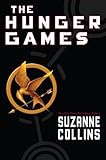 Sixteen-year-old Katniss Everdeen lives in District 12 in the aftermath of some indeterminate disaster that has leveled North America, leaving the country of Panem to rise from the ashes. Katniss lives in District 12, an impoverished area dedicated to the production of coal. After her father died, Katniss became the head of the family and learned to hunt in order to keep starvation at bay, for the Capitol is still punishing the districts for a rebellion over 70 years prior to the book’s beginning, and one of their key weapons is starvation. Each year, the twelve remaining districts (District 13 has been destroyed) must provide a boy and girl between the ages of 12 and 18 as tributes to compete in the Hunger Games, yet another device the Capitol uses to keep the districts in line. The Hunger Games gather 24 tributes to fight to the death and for their survival in an arena for the entertainment of the Capitol residents. Tributes’ names are drawn from lots, and Katniss becomes an unwitting contender in the Games. She’ll have to decide if she has what it takes to do what is necessary to survive the Hunger Games and win.
Sixteen-year-old Katniss Everdeen lives in District 12 in the aftermath of some indeterminate disaster that has leveled North America, leaving the country of Panem to rise from the ashes. Katniss lives in District 12, an impoverished area dedicated to the production of coal. After her father died, Katniss became the head of the family and learned to hunt in order to keep starvation at bay, for the Capitol is still punishing the districts for a rebellion over 70 years prior to the book’s beginning, and one of their key weapons is starvation. Each year, the twelve remaining districts (District 13 has been destroyed) must provide a boy and girl between the ages of 12 and 18 as tributes to compete in the Hunger Games, yet another device the Capitol uses to keep the districts in line. The Hunger Games gather 24 tributes to fight to the death and for their survival in an arena for the entertainment of the Capitol residents. Tributes’ names are drawn from lots, and Katniss becomes an unwitting contender in the Games. She’ll have to decide if she has what it takes to do what is necessary to survive the Hunger Games and win.
I am fan of dystopian fiction. Some of my favorite books are dystopian novels. Does that mean I’m a horrible person who likes to watch others’ misery? Or is it because it’s often the kind of reading that really makes you think? I’d like to think it’s the latter, but reading The Hunger Games made me wonder. It’s the ultimate in reality shows—a fight to the death. We would like to think we would never watch something like that, but maybe we would. Think about the kinds of things we already do watch on reality shows. And this show bears a striking resemblance to shows currently on TV, minus the death perhaps. What author Suzanne Collins does rather convincingly is take a scenario that seems unrealistic and not only make you believe it, but also help you understand we’re not as far away from it as we’d like to think. The book is a real page-turner, and it will probably suck you in by the end of the first chapter. I picked it up because virtually everyone I know was abuzz about the third book in the trilogy, Mockingjay, which was just released this week. I decided I had to see what the fuss was about, and I totally get it. Collins’s spare style authentically captures Katniss’s voice while still managing to provide descriptive details that make the story alive and realistic. In fact, her writing style reminds me of my daughter Sarah’s. I have three children, one of whom is the exact age of Katniss, so it was difficult reading for me as a mom and as a teacher of teenagers in the age group who competed in the games, but if you think Lord of the Flies, it’s not so hard to understand. Why would the Capitol pick children? Because it hurts more. Because they can. Of course, the most disturbing thing about the Capitol residents, which you realize by the end of the book, is that they are us.
Rating:




FTC Disclosure: I borrowed this book from my friend Catherine.
My copy of Mockingjay comes in tomorrow, and I can hardly wait. I love dystopian literature, too, and I also like to think it's because of its ability to make us aware and to make us question.
I'm just hoping I don't like it because of schadenfreude. I like to think I'm a better person than that!
I really do not think it's schadenfreude at all. Characters in books nearly always suffer from one thing or another, so dystopian fiction isn't unique in that regard. I think Collins confronts the question of watching suffering more directly than many dystopian novelists, and I like that layer of meta-ness. (Can I say "meta-ness"?) I think what I like about dystopian books is how they show us to ourselves, and force us to ask ourselves what kind of people we would be, in extreme situations.
Ah yes, excellent point. I think you are spot on about what dystopian novels show us.